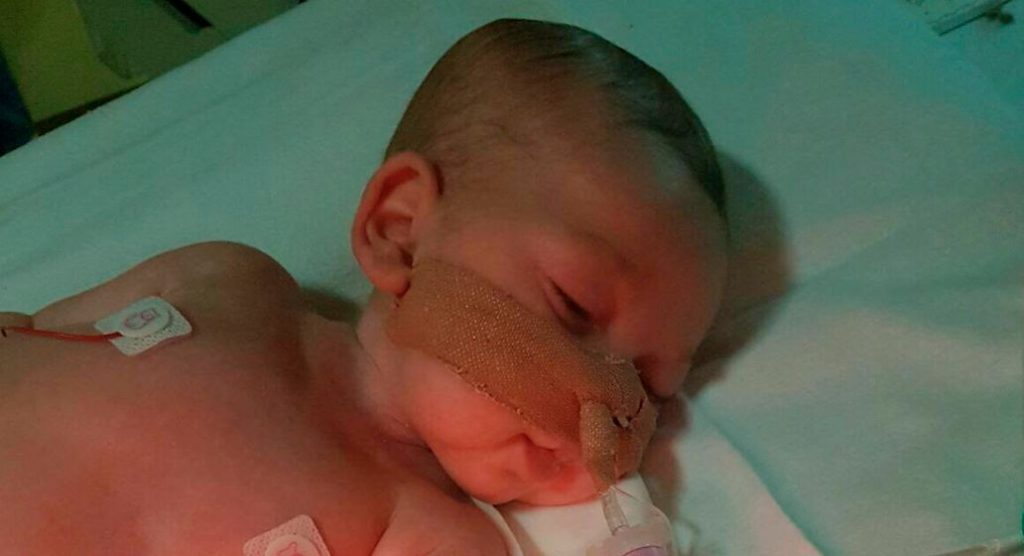The case of Charlie Gard breaks my heart. I can’t imagine anything more tragic than being a parent and having the state interfere with my desire to treat my dying child—even as the lawyer in me recognizes that sometimes the state has a good reason to intervene. Most of the discussion has understandably centered on the fact that, in this situation, a prolonged legal process has circumvented the desires of the parents.
I don’t have to imagine the chilling effect on families facing hard decisions of headlines that equate removing a respirator with killing. Just over a month ago, I had to make that decision for my father in faith, the priest who received me into the Church and trusted me with that task. It was hard enough without headlines contending that discontinuing life support is tantamount to murder echoing in my head, even being well versed in Church teaching on this matter. I can’t imagine the effect of such headlines on other people facing the painful question of whether and when to discontinue life support without an understanding of what the Church teaches and how differing facts can mean completely different answers, each completely moral.
According to the Catechism (CCC 2278), there are two aspects to making a decision about treatment in situations like this. The first consideration is the proposed decision itself: it is permissible (depending on circumstances) to discontinue life-sustaining treatment. To do so, especially in the face of an incurable illness and an irreversible injury, is not to will or cause death, it is to accept that death is impending and to step aside so that the natural course of life continues to its natural end.
The second consideration is who makes the decision. The patient himself should decide whenever possible. When that isn’t possible, the Catechism provides that those legally entitled to act for the patient should do so, but cautions that the decision must always be made from the perspective of the patient himself. Much of the debate in the case of Charlie Gard stems from the fact that two different narratives have emerged: one (represented by the statement by the Pontifical Academy for Life) focusing more on the medical decision being made, the other (articulated by Pope Francis) emphasizing the role of the parents in the decision making process.
Decisions made for one patient may different than those for another. Despite massive coverage, there’s a lot about the Charlie Gard case I don’t know and can’t comment on and the facts matter. The situation of a patient unable to breathe because of viral infection is different from another who, like Charlie Gard, has permanent and progressive respiratory failure. One may agree to respirator support, the other may decide to forgo a respirator altogether; and either may accept it for a period of time and may-or may not-discontinue it later.
Moreover, the decision to refuse care is personal. What is extraordinary or burdensome or disproportionate for one may not be for another. Occasionally patients choose to accept long-term ventilation even though extraordinary and burdensome, but no one is morally obliged to do so. And when a ventilator is removed in the face of such injury or illness death is the result of the underlying disease causing the inability to breathe. It is from natural causes, not an intentional killing.
This kind of controversy is not new. In 1975, the parents of Karen Ann Quinlan wished to discontinue her respirator support after an overdose left her comatose and unable to breathe on her own. Faced with the threat of a homicide charge by the state when they asked to discontinue the life-support, they appealed to the Supreme Court of New Jersey, arguing, consistent with their Catholic faith, that the respirator was extraordinary care and that to discontinue it would not be murder but merely a cessation of treatment that, as long as it was in place, impeded death from the underlying injury.
The court agreed and permitted the Quinlans to discontinue treatment as their daughter’s representative, essentially endorsing in law the concepts taught by the Catechism that it can be permissible to refuse technological advances prolonging existence but unduly burdensome; and that the decision to be made is vested in the patient or his proper advocates. In addition, the judges recognized the practical necessity to establish who among the family could make the decision and make certain to guarantee access to the best medical information available. The opinion went a step farther and encouraged the creation of an ethics committee for assistance and support of Karen Ann’s parents as they evaluated the medical situation and decided what should be done.
It’s still a good model and one Pope Francis seems to approve.
Barbara Golder had a 40-year career in medicine and law, including health care ethics. She is now the award-winning author of the 'Lady Doc' mystery series and serves as Director of Adult Faith Formation and Evangelization at the Basilica of Sts. Peter and Paul, Chattanooga TN. She blogs at ladydoclawyer.com.

